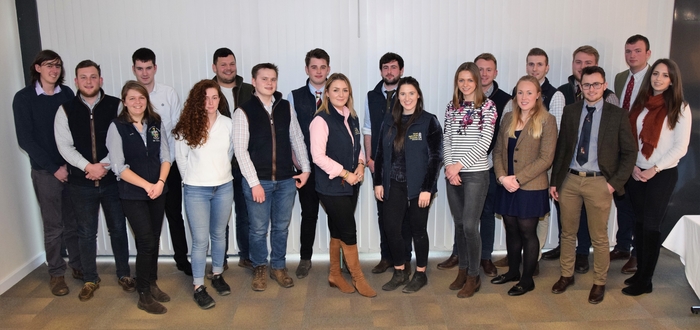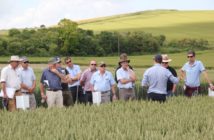Six teams from Universities and Colleges from across the country have been presented with this year’s Cereals Challenge; to grow a virtual crop of winter wheat in a testing set of circumstances.
Launched in Solihull earlier this month, teams from Nottingham University, Newcastle University, Harper Adams University, Writtle University College, Hartpury College and the Royal Agricultural University were presented with this year’s Challenge where the scene was set to grow the best plot of winter wheat on land that has a resistant black-grass challenge and is following a crop of oilseed rape leaving Clearfield volunteers to manage.
Now in its 9th year, the Cereals Challenge aims to encourage a new generation of agronomists and farmers into the industry by offering them a ‘crop’ to manage and is organised by crop production specialists Hutchinsons and farm business management company Velcourt.
Speaking at the launch, Paul Hobson of Hutchinsons explained the reasoning behind the virtual approach. “Previously teams have been given a real plot to manage at the Cereals event site, however with such a geographical spread of teams, this disadvantaged those further away who were not able to visit the site. By creating virtual plots this makes it simpler and fairer for all.”
“A new twist for this year is that we set up the challenge using videos where Keith Norman of Velcourt and Dick Neale of Hutchinsons describe the scope of each challenge; these were from the field where the crop is being grown, and it’s possible to see and get a feel for the soil structure and early weed populations.”
As the spring unfolds the next three steps of the challenge will be conveyed via the Hutchinsons Facebook page – each video blog will highlight what’s happening in the crop and technical experts Dick and Keith will describe the task for the teams to solve.
“We hope this reflects the changing ways in which many young people access information today.”
The wheat plots will still need to be grown and managed as if it were a ‘real’ crop and each team will still have complete responsibility for their crop – from choosing which variety to grow and cultivation and drilling details through to making the real-time agronomy decisions on inputs, emphasises Mr Hobson.
At the launch, teams were asked to give a short presentation on how they had established their plots and variety choice. The Royal Agricultural University team opted to drill a bit later in November ‘so that we could treat the field with glyphosate to clear up any volunteers.’
“We chose to grow Evolution, based on its ability to tiller well and compete with the black-grass. We have gone for a slightly higher seed rate of 350 seeds/m2 and this was drilled using a Vaderstad disc drill, “explains team captain, Tania Coxon.
Nutrient plans from the team included early applications of phosphate and potassium, but no autumn application of nitrogen, reflecting that the field was in a NVZ.
The team from Hartpury direct drilled their crop of Skyfall to avoid moving the soil, reducing black-grass germination. Although a milling variety, the team felt that growing Skyfall gave them the option of aiming for a milling premium but with the fall back of a high yielding feed wheat, should quality be difficult to achieve.
Treated with Beret Gold Deter, the crop was drilled around the 23-31st October at a variable rate of 360-400seeds/m2. Team captain Henry Lock, explained that slug traps will be used before applying metaldehyde and that the team were conscious that as the field was near a water course, stewardship guidelines would need to be closely adhered to.
Last year’s winners Writtle University College believe that the Cereals Challenge is a very valuable way of finding out what it is like to grow a crop like a farm manager or agronomist, needing to make recommendations and last-minute decisions according to the season.
“It’s also a really good chance to raise our profile with potential future employers, as the Challenge receives lots of attention and media profile, so it’s well worth the effort,” says this year’s team captain David Parker who is doing a MSc in Crop Production with a view to being a successful arable farmer.
As part of this year’s Challenge, teams will be asked to write a technical piece on Farm Diversification that would be suitable for publication on a farming website. It will be judged by representatives of the Guild of Agricultural Journalists and has a separate prize of £400 per team and £100 per college. “This element was introduced for the time in 2017 and proved to be a big hit with the teams and added a new dimension to the competition,” says Mr Hobson.
The winners of the Cereals Challenge will be announced and presented with a trophy, £1000 to share as well as £500 for their College, on the Hutchinsons stand at the 2018 Cereals Event at Chrishall Grange farm in Cambridge on Wednesday 13th June 2018.
Follow the 2018 Cereals Challenge on Twitter #CerealsChallenge2018 where you can meet the teams and keep up-to-date with what is happening on the plots.




